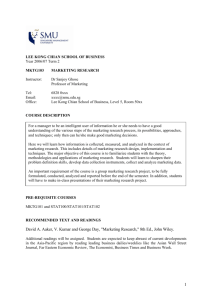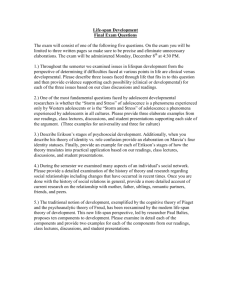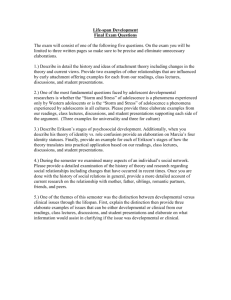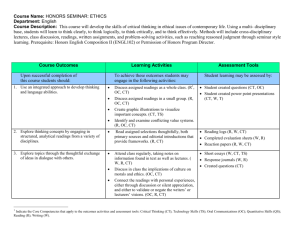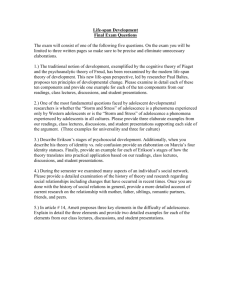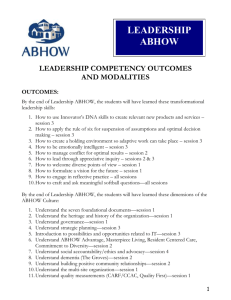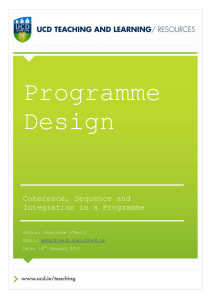UNIVERSITY OF NORTHERN COLORADO
advertisement
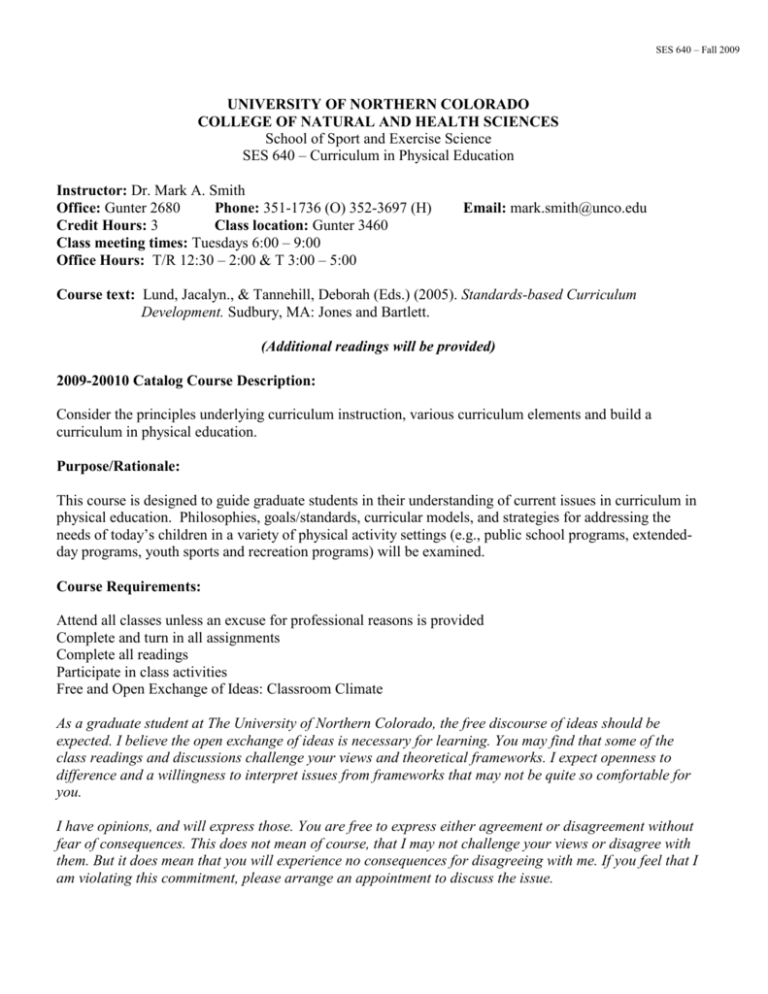
SES 640 – Fall 2009 UNIVERSITY OF NORTHERN COLORADO COLLEGE OF NATURAL AND HEALTH SCIENCES School of Sport and Exercise Science SES 640 – Curriculum in Physical Education Instructor: Dr. Mark A. Smith Office: Gunter 2680 Phone: 351-1736 (O) 352-3697 (H) Credit Hours: 3 Class location: Gunter 3460 Class meeting times: Tuesdays 6:00 – 9:00 Office Hours: T/R 12:30 – 2:00 & T 3:00 – 5:00 Email: mark.smith@unco.edu Course text: Lund, Jacalyn., & Tannehill, Deborah (Eds.) (2005). Standards-based Curriculum Development. Sudbury, MA: Jones and Bartlett. (Additional readings will be provided) 2009-20010 Catalog Course Description: Consider the principles underlying curriculum instruction, various curriculum elements and build a curriculum in physical education. Purpose/Rationale: This course is designed to guide graduate students in their understanding of current issues in curriculum in physical education. Philosophies, goals/standards, curricular models, and strategies for addressing the needs of today’s children in a variety of physical activity settings (e.g., public school programs, extendedday programs, youth sports and recreation programs) will be examined. Course Requirements: Attend all classes unless an excuse for professional reasons is provided Complete and turn in all assignments Complete all readings Participate in class activities Free and Open Exchange of Ideas: Classroom Climate As a graduate student at The University of Northern Colorado, the free discourse of ideas should be expected. I believe the open exchange of ideas is necessary for learning. You may find that some of the class readings and discussions challenge your views and theoretical frameworks. I expect openness to difference and a willingness to interpret issues from frameworks that may not be quite so comfortable for you. I have opinions, and will express those. You are free to express either agreement or disagreement without fear of consequences. This does not mean of course, that I may not challenge your views or disagree with them. But it does mean that you will experience no consequences for disagreeing with me. If you feel that I am violating this commitment, please arrange an appointment to discuss the issue. SES 640 – Fall 2009 Please be sensitive in your class participation by not unfairly dominating discussions. My goal is to create a psychologically safe space in which everyone feels that they can participate in the discussion. This does not mean people cannot disagree. This does not mean people cannot have emotions connected to their words. What it does mean is that we all need to be sensitive, appreciative, and respectful, no matter how strongly we might disagree. Assignments: 1. Participation-attendance, readings, homework, support group, and in class assignment. Participation is defined as speaking an appropriate amount of time during class discussions, attending class prepared, completing all readings, doing in class and out of class assignments and being a productive member of your small group (Including Learning Activity Sheets) [100 points] 2. Curriculum Presentations. Individuals or pairs will present a curriculum model drawn at random. No written report is required, yet any helpful handouts or other materials are encouraged. Presentation groups are encouraged to be creative and initiate an interactive learning environment by allowing and incorporating class participation when possible. Each Presentation will last 1 hour [50 points] 3. Final exam. The exam will include information from discussions, readings and presentations. The exam can and will take a variety of formats beyond the traditional paper and pencil test. [50 points] 4) Project Proposal [50 points] – Late proposal section will equal a 50% deduction in points. PART A [30 points]: You will construct a curriculum project proposal and purpose statement. This will be a 6-8 page (double spaced) paper that sets out a problem that you are interested in examining. It should contain the following sections: Statement of the Problem o What is the problem? o How has it been addressed in the literature? (include 4-5 references on the topic) o What is the gap in the literature? Purpose of the Project o What is the purpose of your project? o What do you want to learn about? o Identify several areas that you think are beneficial to you and your students/athletes? Personal Statement o Who are you in relation to your research project? The statement should describe your experiences, training, and teaching philosophies that shape your beliefs, values and understandings of the curriculum. Three copies of the proposal using APA format must be handed in for peers and the instructor to critique. SES 640 – Fall 2009 PART B [20 points]: You will construct a “How to” Section. This will be a 3-4 page (double spaced) paper that outlines your curriculum intervention and context. It should contain the following sections: a. b. c. d. Participants Setting Curriculum Intervention (What you are planning to do?) “Production” timeline 4. Project. Create your own physical activity based curriculum for a setting, activity or program of your choice. Your curriculum theory/philosophy must be included with references that support your perspective and rationale. Program goals, conformance to appropriate district and state standards, relevant physical activity content, program strategies, assessment of participant learning and how a lesson or unit might look should be included. All projects must be approved by the instructor. [150 points] 5. Project Presentations. Individuals will have no more that 15-minutes to presents that curriculum project. A presentation rubric will be provided for grading purposes. [50 points] SES 640 – Fall 2009 Tentative Class Schedule (Topics, dates and reading can be changed to meet the learning needs of the students and unforeseen circumstances) August 25: Introduction (roll; syllabus; overview of curriculum theory; what do we want of our schools?). In Class Reading: 1) Schubert Preface – Handout; 2) Jewitt, Ennis and Bain Chapter 2 – Curriculum Metaphors) September 1: Curriculum and Philosophy: BB Readings #1 - #4: Contemporary issues (Ch, 1, 2, 3, 5) BB Reading #5: Handbook: Ch1 Curriculum Policy and the politics of What should be learned in Schools DUE: Learning Activity Sheet 1 September 8: Curriculum Development. Design and objectives BB #6: Ornstein & Hunkins – Chapter 7: Curriculum Development BB #7: Ornstein & Hunkins – Chapter 8: Curriculum Design BB #8: Ornstein & Hunkins – Chapter 9: Aims, Goals and Objectives DUE: Learning Activity Sheet 2 September 15: Physical education: philosophical justification; theories and models; components of a curriculum. CT, Ch 1: NASPE standards; Citizenship and physical education. Standards-based education – Jacalyn Lund CT, Ch 2: What makes a quality program? – Deborah Tannehill DUE: Learning Activity Sheet 3& Curriculum proposal Part A September 22: Considerations for curriculum. CT, CH 4: Developing curriculum to meet the needs of ALL youth – Gay Timken BB #9: Handbook Ch. 6 - Curriculum Implementation and Sustainability BB #10: Handbook Ch. 10 - Students experiences of curriculum DUE: Learning Activity Sheet 4 September 29: So what does a quality physical education curriculum look like?? (Development of the Final Curriculum Project & Criteria) Readings TBA DUE: Learning Activity Sheet 5 Curriculum proposal Part B October 6: No Class PETE Conference (Myrtle Beach, SC) October 13: Student Curriculum Presentations and Project Discussions CT, Ch 12: Fitness-based education – Karen McConnell BB # 11: Interdisciplinary curriculum in physical education – Judith Placek DUE: Learning Activity Sheet 6 SES 640 – Fall 2009 October 20: Student Curriculum Presentations and Project Discussions CT, Ch 9: Movement education/developmental/skill themes – Shirley Ann Holt/Hale CT, Ch 6: Personal and social responsibility – Melissa Parker & Jim Stiehl DUE: Learning Activity Sheet 6 October 27: Student Curriculum Presentations and Project Discussions CT, Ch 7: Adventure Education – Ben Dyson and Mike Brown CT, Ch 8: Outdoor education – Jim Stiehl & Melissa Parker DUE: Learning Activity Sheet 8 November 3: Student Curriculum Presentations and Project Discussions Ch 10, Teaching games for understanding – Judy Oslin & Steve Mitchell Ch 11, Sport education – Deborah Tannehill & Hans van der Mars DUE: Learning Activity Sheet 9 November 10: Curriculum Implementation and Evaluation BB #12: Ornstein & Hunkins – Chapter 10: Curriculum Implementation CT, Ch 13: Evaluating Your Physical Education Curriculum - & Jacalyn Lund & Deborah Tannehill DUE: Learning Activity Sheet 10 November 17: Final Exam CT, Ch 14: It’s Not Business as Usual – Deborah Tannehill & Jacalyn Lund BB #13: Cothran, D. J. (2001). Curricular change in physical education: Success stories from the front line. Sport, Education and Society, 6(1), 67-79. (Additional information, reading, handouts and expectations will be provided). December 1: Curriculum Project Presentations December 8: Final Curriculum Projects Due KEY: BB R = Blackboard Reading # CT = Course Text SES 640 – Fall 2009 Notes Class participation and attendance are important in a process-oriented course such as this one, but I understand that things come up. Therefore, if you are going to be absence, please contact the instructor as soon as possible, any materials missed must be made up when possible. Students who believe they may need accommodations in this class are encouraged to contact the Disability Access Center (970/351-2289) as soon as possible to better ensure that such accommodations are implemented in a timely fashion. I will send e-mails using a format to be discussed during the first class session. All members of the University of Northern Colorado community are entrusted with the responsibility to uphold and promote five fundamental values: Honesty, Trust, Respect, Fairness, and Responsibility. These core elements foster an atmosphere, inside and outside the classroom, which serves as a foundation and guides the UNC community’s academic, professional, and personal growth. Endorsement of these core elements by students, faculty, staff, administration, and trustees strengthens the integrity and value of our academic climate. UNC's policies and recommendations for student rights and responsibilities and for academic misconduct will be followed. These are available on UNC’s websites at www.unco.edu/dos/handbook/stuhndbk.htm#univstanconduct and at www.unco.edu/dos/handbook/stuhndbk.htm#acadexpect. Pay particular attention to the “Student Guide to Understanding Plagiarism” available at www.unco.edu/dos/plagiarism.htm. Please extend courtesy to your instructor and fellow students by turning off your cell phones and pagers. Thank you for your cooperation.


